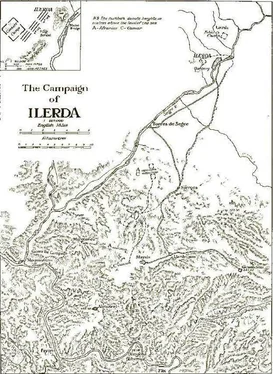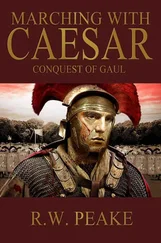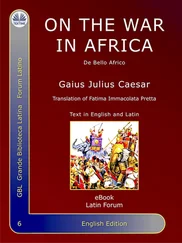R. Peake - Marching With Caesar – Civil War
Здесь есть возможность читать онлайн «R. Peake - Marching With Caesar – Civil War» весь текст электронной книги совершенно бесплатно (целиком полную версию без сокращений). В некоторых случаях можно слушать аудио, скачать через торрент в формате fb2 и присутствует краткое содержание. Жанр: Исторические приключения, на английском языке. Описание произведения, (предисловие) а так же отзывы посетителей доступны на портале библиотеки ЛибКат.
- Название:Marching With Caesar – Civil War
- Автор:
- Жанр:
- Год:неизвестен
- ISBN:нет данных
- Рейтинг книги:5 / 5. Голосов: 1
-
Избранное:Добавить в избранное
- Отзывы:
-
Ваша оценка:
- 100
- 1
- 2
- 3
- 4
- 5
Marching With Caesar – Civil War: краткое содержание, описание и аннотация
Предлагаем к чтению аннотацию, описание, краткое содержание или предисловие (зависит от того, что написал сам автор книги «Marching With Caesar – Civil War»). Если вы не нашли необходимую информацию о книге — напишите в комментариях, мы постараемся отыскать её.
Marching With Caesar – Civil War — читать онлайн бесплатно полную книгу (весь текст) целиком
Ниже представлен текст книги, разбитый по страницам. Система сохранения места последней прочитанной страницы, позволяет с удобством читать онлайн бесплатно книгу «Marching With Caesar – Civil War», без необходимости каждый раз заново искать на чём Вы остановились. Поставьте закладку, и сможете в любой момент перейти на страницу, на которой закончили чтение.
Интервал:
Закладка:
~ ~ ~ ~
The sun rose to the pall of smoke hanging above the Pompeian camp and we learned that at least our comrades had been cared for in the proper manner. Under banner of truce, a Tribune was sent to assure us that their remains would be sent to their kin, with all proper honors and rights, and while we doubted their word, we had no choice but to believe them. In the meantime, their command group held another council, apparently deciding that their position on this hill, even with water, was untenable. Just as both command groups were conferring, a new development changed the balance further in our favor in one way, but caused us more hardship in another. The auxiliary force of the Pompeians, like all auxiliaries, were neither as well equipped nor as well supplied as the Legions, meaning their supply situation was even worse than the rest of the Pompeian army. Not seeing any relief coming from any source, they began to desert to us, first in small numbers, then in a veritable flood of men who came streaming to our camp, begging us to give them shelter and food in exchange for their service. Again, Caesar ordered clemency and we took all of them in, even with the extra strain it put on our own supply situation.
Despite these desertions relieving some of the pressure from the Pompeians, it still was not enough, and they made the decision to march back to Ilerda to their supply base. This time the Pompeians marched in a double column, except that they prepared to defend against our cavalry by having their rearguard march without their packs, putting them on mules to give them the best possible mobility against our horsemen. Again, the terrain proved to be a challenge, but for both sides this time. With the Pompeian column marching up one of the hills, the rearguard was then protected by their comrades on the higher slopes, who could fling their javelins down at our cavalry. However, once they reached the crest of the hill to start down the opposite side, the rearguard no longer had the protection of their comrades, thereby immediately coming under assault from our cavalry, who charged in to fling their own missiles, inflicting several casualties. After this was repeated a couple of times, the Pompeians adjusted by sending their rearguard in a headlong charge at our cavalry, while the main body would hurry across the level ground to the next slope. The rearguard would then turn and run to join their comrades in the time it took our cavalry to regroup. In this manner, they made a slow but steady progress, covering about four miles before halting on a hill, fortifying the slope that faced us, although they left their baggage packed on their mules. We did likewise, making camp, except that we did unpack our mules, pitching our tents and going about the business of digging the ditches and throwing up the walls.
Although from outward appearances we had taken the bait, once again, Caesar was a step ahead, having passed the word that we were to be ready to drop everything to resume our pursuit at his order. Several Cohorts were ordered to remain behind to pack the camp up should the Pompeians make a break for it, and we did not have long to wait; perhaps a third of a watch had passed when the alarm was raised that they were again on the move. Springing into action, we fell back into marching formation and were in pursuit no more than a sixth part of a watch later, with our cavalry soon back harrying the Pompeian rearguard. This time, our cavalry attacks inflicted heavy casualties on the rearguard; whether it was due to more vigor on the part of our men, or fatigue on the part of the Pompeians we could not tell, but the ground was soon littered with bodies as the bulk of the enemy still struggled towards Ilerda. The Pompeians had gotten back into the open ground surrounding the town, no longer even having the cover and protection of the small hills and rocky terrain, and it was not much longer before their commanders called another halt. Since our baggage had not been retrieved yet, we did what we could to make ourselves comfortable and secure, watching the Pompeians working feverishly to improve on their position.
Once more, the Pompeians were in desperate straits because they had halted a distance away from one of the reservoirs, while Caesar had halted us much closer to it so we did not have the same problem. As they had previously, the Pompeians began extending their fortifications towards the reservoir in an attempt to secure a supply of water, working the rest of the day and through the night. Now, however, their problem was twofold; not only did they have to get to the water, the reservoir itself was smaller than most of the others in the area, our own needs draining it almost dry by the time their ditch and wall got close. The sun rose to a desperate plight for the Pompeians when they were greeted by a sight that had caused despair in countless other enemies of Caesar; he had put us at work building a contravallation. Our baggage had caught up with us in the night, whereupon we were put immediately to work, save for a number of Cohorts left on guard. The enemy started slaughtering their remaining cattle and even killed their mules, sparing only the cavalry horses, which were sent, along with every spare man, out to find water. We were too occupied in throwing up our fortifications to spend any time pursuing the Pompeians, who went scrambling about the countryside looking for water, besides the fact that our own cavalry had already scoured the region and if there was a drop of water or a kernel of grain, it was in our possession. We spent the entire day digging, chopping, and sweating, the Pompeians only able to watch in frustration and I suspect not a small amount of fear as what was effectively a noose neared completion. Finally stopping at sunset, the men were exhausted, filthy, and barely able to pick at their evening meal. Conversation was desultory; the almost nonexistent grumbling was a sure sign of their fatigue, it simply took too much energy.
While the men rested, I was called to a meeting of the senior Centurions of the army with Caesar, who praised the work that the men had accomplished before telling us his plans for the following day. We would be finished with the contravallation by the end of the next day, and Caesar believed that the Pompeians would be forced to make a move before that happened. Accordingly, he ordered that we not commit all of our men to the work, instead having them work in shifts so that they might spare their energy. Despite knowing this would slow the work somewhat, he believed that the Pompeians would not be willing to wait and would make a move the next day. And as usual, he was right, although it was not quite the battle that we thought it would be.
~ ~ ~ ~
We began working the next morning at dawn in the manner prescribed by Caesar, and there was a sense of anticipation running through the men, a sense that the Centurions shared. Once an army is forced to slaughter its pack animals, that is a sure sign that the end is near because they are sacrificing their mobility; they must either stand and fight, or in turn be slaughtered themselves. The progress of our work slowed because of the reduced labor force, but it was still significant. Finally, in the afternoon, there was a stirring in the Pompeian camp. Since our camps were not more than a few hundred paces apart, we could clearly hear the sounds of the cornu and bucina that were sending the Pompeians into a frenzy of activity. Not long after, Caesar issued his own orders, so our horns added to the din, calling the men working on the contravallation to stop and make their way back to camp, while the men in camp who were resting now hurried to gather their weapons and fall into formation. I walked around my Cohort area, while Longus and Crispus brought back our men out working on the contravallation, and I made sure the rest of the men were moving as quickly as I thought they should be, helped by an occasional prod from my vitus .
Читать дальшеИнтервал:
Закладка:
Похожие книги на «Marching With Caesar – Civil War»
Представляем Вашему вниманию похожие книги на «Marching With Caesar – Civil War» списком для выбора. Мы отобрали схожую по названию и смыслу литературу в надежде предоставить читателям больше вариантов отыскать новые, интересные, ещё непрочитанные произведения.
Обсуждение, отзывы о книге «Marching With Caesar – Civil War» и просто собственные мнения читателей. Оставьте ваши комментарии, напишите, что Вы думаете о произведении, его смысле или главных героях. Укажите что конкретно понравилось, а что нет, и почему Вы так считаете.












